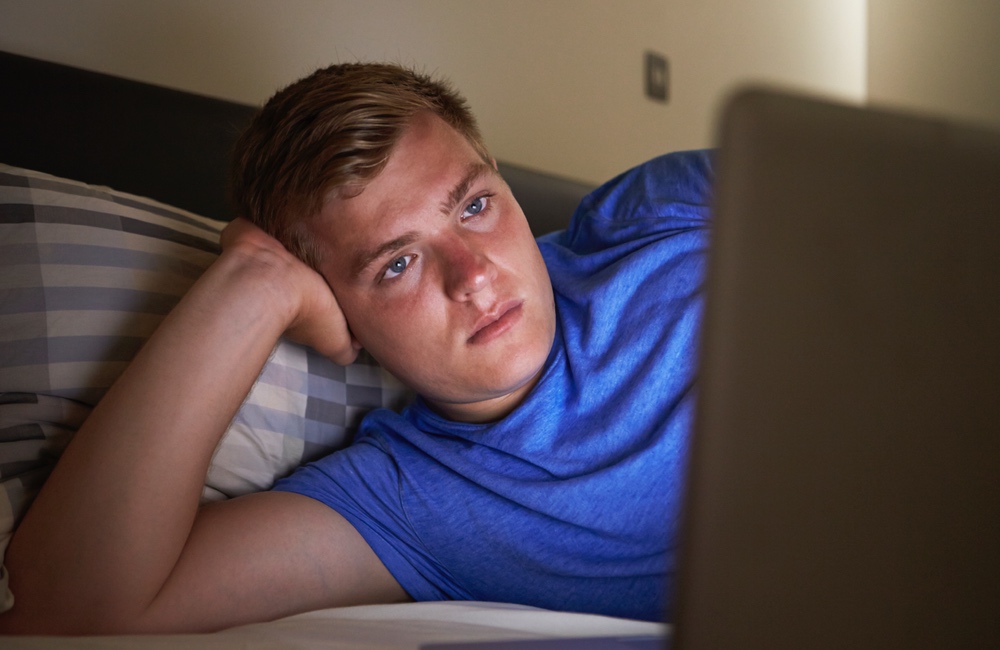After a long evening of homework that may include hours in front of a computer screen, many adolescents relax by texting their friends, checking Facebook, or looking at shopping or fantasy sports sites online (of course, they may have been doing this while doing their homework as well).
They think they are winding down, but, in fact, their extra screen time at night is resetting their bodies' clocks in such a way as to make it more difficult to get to sleep, particularly if they are just entering, or are in the early stages of puberty. This shift in the body's circadian rhythm and the lack of sleep it brings can persist into adulthood.
It is well-known that many teens don't get sufficient sleep. Their fatigue can lead to poor school performance, emotional and behavioral problems, obesity, dangerous driving and poor decision-making.
There are numerous reasons for sleepy teens — they may be over-scheduled with activities and sports, feeling pressured academically, holding jobs after school and evenings, suffering from depression, living in stressed home situations, abusing substances such as alcohol or marijuana, and others.
But one of the biggest reasons teens find it difficult to fall asleep at night is the blue light emitted by the screens of their cell phones, tablets and computers. Fortunately, this is also one of the easiest to fix.The widespread use of tablets, smart phones and computers prior to bedtime among adolescents can greatly shift teens' very sensitive body clocks and is a risk factor for poor sleep in the teen years.
A recent study, published in the Journal of Clinical Endocrinology and Metabolism, described how exposure to light from their screens around bedtime changes the body's clock and prevents teens from getting enough restful sleep.
Studies have shown that the effect of exposure to light on the production of melatonin changes during the life cycle. In adolescence, a delay shift in the circadian timing system means teens feel sleepy later, and so stay up too late to get the seven to eight hours of sleep their bodies need.
Teens in the study were divided into two groups, not according to age, but based on their physiological maturity — their puberty level — whether they were physically in pre- to mid-puberty or late to post-puberty. The two groups were exposed to different intensities of light for an hour in the evening or in the morning. The light strengths were comparable to mood lighting, normal room light, and supermarket light.
After these exposures, researchers measured the amount of melatonin in the teens' saliva so they could see how different intensities and timing of light exposure affected the teens' sleep hormone levels.Only nighttime exposure to light had the effect of resetting the body's clock; the morning light exposures, at all three levels, did not affect melatonin levels at all.
Sixty minutes after exposure to evening light, the melatonin levels were lower among teens in the pre/mid puberty group compared to the more developed, late/post puberty group. Being exposed to light at all three levels suppressed the production of melatonin significantly in this less developed group. This finding was the same for both males and females in the less mature group.
But when the two age groups were exposed to different light strengths in the morning, unlike the nighttime exposure, there were no significant differences between the two groups in terms of melatonin levels. Only nighttime exposure to light had the effect of resetting the body's clock; the morning light exposures, at all three levels, did not affect melatonin levels at all.
Based on these findings, it appears that the circadian system of children early in puberty is more responsive to evening light than it will be in later or post-puberty. Members of this less physically mature group have more sensitive systems and more vulnerable body clocks.
That is why they showed greater suppression of melatonin at all tested levels of light.
Parents need to understand that the widespread use of tablets, smart phones and computers prior to bedtime among adolescents can greatly shift teens' very sensitive body clocks and is a risk factor for poor sleep in the teen years.
Even low amounts of light before bedtime can reset teens' bodies' internal clocks so it takes them a longer time to fall asleep, have heightened evening arousal, and shorter sleep cycles. This may result in the many problems — academic, emotional and otherwise — related to overtired teenagers. Now parents have yet another reason to address screen use, including content, amount, and timing, with their children.





